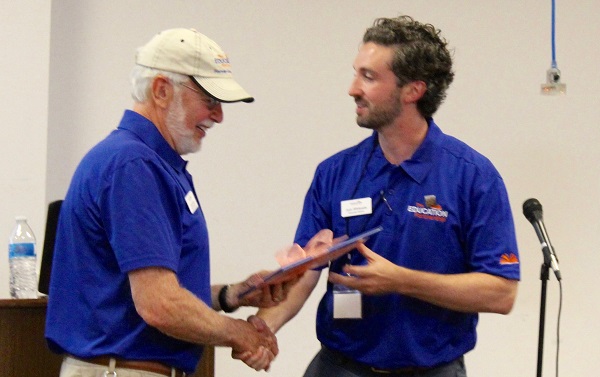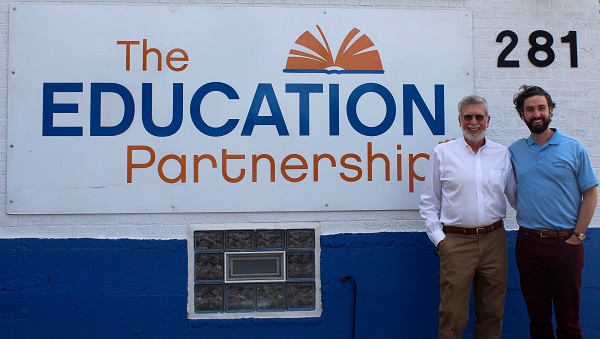
When is a pencil a power tool? Ask Justin Brown and the Education Partnership
About 10 years ago, Justin Brown was seeking an answer to a question that long bewildered him: Why didn’t kids have the supplies they needed to learn in schools? As director of the Pittsburgh Community Storehouse, which made donations to disadvantaged communities, he understood the frustrations of teachers in those neighborhoods.
He learned about the Kids in Need national summit in Columbus, Ohio, which included a session on teacher free stores.
“That’s when I discovered both the need and the solution,” Brown says. “It was an excellent non-profit model, and it’s the model I brought back to Pittsburgh and started to develop.”
In 2009, Brown launched the Storehouse for Teachers, now known as the Education Partnership. Since then, the organization has been a godsend for teachers and kids. Using the idea that a simple pencil can be a power tool that’s packed with potential, the organization puts basic supplies in the hands of kids and their teachers.
During the 2017-18 school year, the Education Partnership provided supplies for 45,000 students in 110 schools. To be a partner school, 70 percent of the student population must be eligible for a free or reduced lunch program.
Every teacher in the school can visit the West End warehouse twice a year and load up on core supplies (papers, pens) and incentive supplies (clothing, toys), and is guaranteed $400 worth of goods. There’s also a lending library for STEAM (science, technology, engineering, arts, and math) projects with computers and other technology.
“It actually works,” Brown says. “It’s actually doing exactly what it’s supposed to be doing: Impacting the lives of teachers, invigorating them to be alive in their work, and making them feel like they’re being supported.”
In turn, kids are equipped with the supplies they need for educational success. Those basic supplies also go home with kids so they can complete homework assignments and feel confident and prepared in class.
Last month, as Brown prepared to leave his position as executive director, the Kids in Need Foundation brought its national conference to Pittsburgh. A decade earlier, Kids in Need would have had no interest in coming here because there was no comparable local organization.
Justin Brown was the man who made the difference.

“The framework that has been built here is nothing short of extraordinary,” says Josh Whiteside, who succeeded Brown at the Education Partnership. “When you look at the trajectory of what the Education Partnership has accomplished, going from zero to 45,000 students today, that’s remarkable.”
How did Brown, a musician and self-styled entrepreneur, who worked as a bartender and insurance salesman, make the Education Partnership one of the region’s most successful non-profit organizations?
First, he put together a sophisticated business plan with the help of interns from Carnegie Mellon University’s Tepper School of Business. Using advanced metrics, Brown made sure to include data about how many schools and students needed supplies.
He then sought funding from local foundations. In succession, the Buhl Foundation, the Pittsburgh Foundation, the Heinz Endowments, and the Grable Foundation all offered to fund Brown’s project. The reason for his success?
The Education Partnership filled a need. There was no overlap, no charity seeking to fill the same void.
“When I went to the Heinz Endowments what they told me was `Justin, we hope and pray for your success because we’ve launched so many programs to help kids get educated that have fallen flat because they don’t have the basic school supplies,’ ” Brown says.
Brown also approached stakeholders – schools, teacher unions and boards of education – to see what they needed and assure them he was there to help. It was a pure grassroots campaign. Brown now finds validation in the number 3,580. That’s how many teachers came through Education Partnership’s doors in the West End last year.
Julie Erb, a kindergarten teacher at Martin Elementary School in New Kensington, has “shopped” at the Education Partnership for three years.
“Supplies like crayons, scissors, pencils, glue sticks, paper and so much more help to make learning fun and engaging for my students,” she says. “These basic essentials become costly for teachers. Thanks to the Education Partnership, I save hundreds of dollars a year with the generous supplies we receive from them. Not to mention it’s fun to shop there too! The staff and volunteers are so welcoming and helpful. … Every year I thank them from the bottom of my heart.”
There is still more work to be done. There are 85 eligible schools on a waiting list for the Education Partnership’s services.
“It’s terrible saying no (to schools),” Brown says. “Especially when our per-student cost is less than a school district’s cost. When we can buy 300 pencils for a dollar and tell a school we can’t give them pencils, it’s very difficult.”
Filling that void will be now be left to Whiteside. Formerly executive director of the non-profit Beverly’s Birthdays, Whiteside is confident the foundation Brown has built will serve the organization well in the future.
“I lovingly call Justin Professor Brown,” Whiteside says, “because the opportunity to have him stick around to teach me about the history of the organization, to introduce me to the key people who helped build this, to let me know the pitfalls he has fallen into so that I don’t, the opportunity to have someone like that right next to you, who not only knows the organization but started the organization, is pretty rare.”
Brown plans to spend more time with his family and perhaps find a charitable outlet for his musical talents. But his legacy will be the Education Partnership. Being able to host the Kids in Need Foundation’s national conference was the cherry on top of everything he hoped to accomplish.
“The goal of any executive director is to create an organization that would live beyond his term,” Brown says. “And I think the fact I did grow it on my watch to the point where it warranted us hosting the national summit, it was a point of pride, a sense of accomplishment. What a great time to hand it over.”